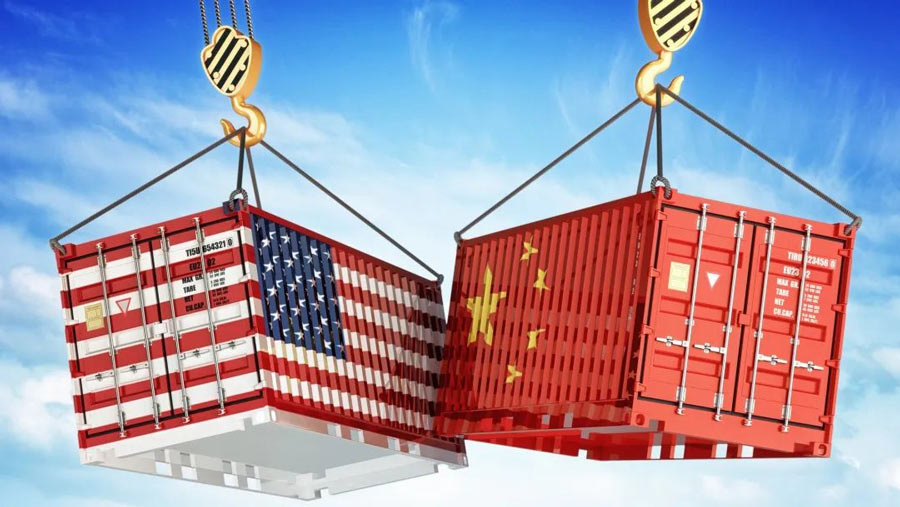

Liner companies adjusted their capacity in response to the tariff war
In the face of the all-out "tariff war" between China and the United States, liner companies have begun to gradually withdraw capacity from trans-Pacific routes to cope with market uncertainties.
The tariff war is widely expected to shrink demand for container shipping. From the import data since the 2024 US election and the forecast for the next few months, the market is experiencing a "start-fall" cycle.
The forecast, released jointly by the National Retail Federation (NRF) and Hackett Associates, shows that imports at major U.S. container ports are expected to pick up slightly in February, while imports in March, the traditional slow season, will still rise 11.1 percent year-on-year to 2.14 million TEU. However, the growth momentum is expected to slow significantly after April: imports are expected to be 2.18 million TEU in April (+ 8.2% YoY), 2.19 million TEU in May (+ 5.4% Yoy), and 2.13 million TEU in June (-0.6% YoY).
Due to concerns about the early "rush" overdraft subsequent demand, liner companies have adjusted the capacity layout.
Mediterranean Shipping (MSC) became the "leader" of the exodus. The company announced that it has indefinitely shelved the planned addition of a fifth Asia-U.S. West Coast route, Mustang. MSC said: "Given the current challenging conditions in the trans-Pacific market, we have decided to optimise resource allocation by redeploying capacity from Mustang to other routes around the world."
The Mustang route was first announced in November 2024 as an integral part of MSC's independent east-west route network. However, since January, rates on Asia-West Coast routes have continued to plummet, falling from nearly $6,000 per FEU to $3,451 per FEU on March 3.
Although US importers have stepped up shipments to avoid the risk of tariff increases, freight rates have continued to fall, further exacerbating market uncertainty.
MSC has begun to withdraw its 24,000 TEU class very large vessels from some routes, such as redirecting capacity used for the Asia-Northern Europe route to the Mediterranean and West African markets. At the same time, Linerlytica reports that Ocean Alliance members - CMA CGM, COSCO Shipping, Orient Overseas and Evergreen Shipping - have also decided to postpone the addition of Asia-Northern Europe routes scheduled for March.
MSC's move comes after the Premier alliance, comprising Japan Ocean Network Shipping (ONE), Yangming Shipping and HMM, announced the postponement of two trans-Pacific routes scheduled to open in May.

The tariff war is widely expected to shrink demand for container shipping. From the import data since the 2024 US election and the forecast for the next few months, the market is experiencing a "start-fall" cycle.
The forecast, released jointly by the National Retail Federation (NRF) and Hackett Associates, shows that imports at major U.S. container ports are expected to pick up slightly in February, while imports in March, the traditional slow season, will still rise 11.1 percent year-on-year to 2.14 million TEU. However, the growth momentum is expected to slow significantly after April: imports are expected to be 2.18 million TEU in April (+ 8.2% YoY), 2.19 million TEU in May (+ 5.4% Yoy), and 2.13 million TEU in June (-0.6% YoY).
Due to concerns about the early "rush" overdraft subsequent demand, liner companies have adjusted the capacity layout.
Mediterranean Shipping (MSC) became the "leader" of the exodus. The company announced that it has indefinitely shelved the planned addition of a fifth Asia-U.S. West Coast route, Mustang. MSC said: "Given the current challenging conditions in the trans-Pacific market, we have decided to optimise resource allocation by redeploying capacity from Mustang to other routes around the world."
The Mustang route was first announced in November 2024 as an integral part of MSC's independent east-west route network. However, since January, rates on Asia-West Coast routes have continued to plummet, falling from nearly $6,000 per FEU to $3,451 per FEU on March 3.
Although US importers have stepped up shipments to avoid the risk of tariff increases, freight rates have continued to fall, further exacerbating market uncertainty.
MSC has begun to withdraw its 24,000 TEU class very large vessels from some routes, such as redirecting capacity used for the Asia-Northern Europe route to the Mediterranean and West African markets. At the same time, Linerlytica reports that Ocean Alliance members - CMA CGM, COSCO Shipping, Orient Overseas and Evergreen Shipping - have also decided to postpone the addition of Asia-Northern Europe routes scheduled for March.
MSC's move comes after the Premier alliance, comprising Japan Ocean Network Shipping (ONE), Yangming Shipping and HMM, announced the postponement of two trans-Pacific routes scheduled to open in May.





